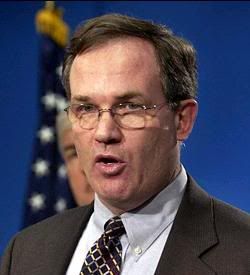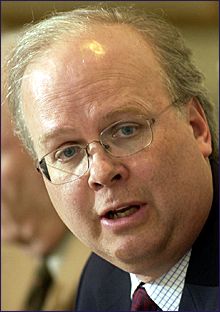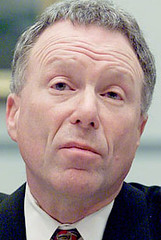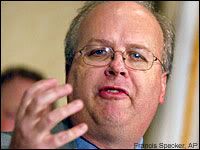Rove and Cheney Are Now Caught In Fitzgerald's Web; Will they Go Down too?

By Jason Leopold
Now it’s about the
Last week, after securing a five-count criminal indictment against Vice President Dick Cheney’s Chief of Staff, I. Lewis “Scooter” Libby, for lying to a grand jury about what he knew and when he knew it in regard to the outing of a covert CIA agent, Special Prosecutor Patrick Fitzgerald plans to pursue broader conspiracy charges against Cheney senior White House officials, and top officials at the State Department and the National Security Council, that may finally shed light on how the Bush administration came to use erroneous intelligence that claimed Iraq tried to purchase yellowcake uranium from Niger, lawyers involved in the two year old investigation said.
While many federal officials and the media have long speculated that Fitzgerald was not only looking into the identity of administration officials who leaked undercover CIA operative Valerie Plame Wilson to a handful of reporters, it was only recently that those rumors were confirmed.
According to a court filing posted on the website of Patrick Fitzgerald, the special prosecutor investigating who leaked the name of undercover CIA agent to reporters, was interested in questioning New York Times reporter Judith Miller about the CIA agent or whether she discussed
"On August 12 and August 20, 2004, grand jury subpoenas were issued to reporter Judith Miller and her employer, the New York Times, seeking documents and testimony related to “conversations between Miller and a specified government official occurring between on or about July 6, 2003 and on or about July 13, 2003, concerning Valerie Plame Wilson (whether referred to by name or by description) or concerning Iraqi efforts to obtain uranium.” the filing made by Fitzgerald last year states.
NATO sources told United Press International that Fitzgerald's team of investigators has sought and obtained documentation on the forgeries from the Italian government.
According to the report, "Fitzgerald's team has been given the full, and as yet unpublished report of the Italian parliamentary inquiry into the affair, which started when an Italian journalist obtained documents that appeared to show officials of the government of
This claim, which made its way into President Bush's State of the Union address in January, 2003, was based on falsified documents from Niger and was withdrawn by the White House one day after former Ambassador Joseph Wilson wrote an op-ed in the New York Times in July 2003 disputing the administration’s claims that Iraq tried to purchase uranium from Niger. It was
But Fitzgerald’s investigation into the leak has led to many discoveries by the prosecutor, one of which is that Cheney played a key role in the leak and the reason was to closely guard the fact that the White House knowingly used false intelligence, specifically the
Over the past month, Fitzgerald has turned his attention to a little known cabal of administration hawks known as the White House Iraq Group (WHIG), which came together in August 2002 to publicize the threat posed by Saddam Hussein. WHIG was founded by Bush chief of staff Andrew Card and operated out of the Vice President’s office.
Fitzgerald’s examination centers on a group of players charged with not only selling the war, but according to sources familiar with the case, to discredit anyone who openly “disagreed with the official Iraq war” story.
The group’s members included Deputy White House chief of staff Karl Rove, Bush advisor Karen Hughes, Senior Advisor to the Vice President Mary Matalin, Deputy Director of Communications James Wilkinson, Assistant to the President and Legislative Liaison Nicholas Calio, Secretary of State Condoleezza Rice, National Security Advisor Stephen Hadley and I. Lewis “Scooter” Libby - Chief of Staff to the Vice President and co-author of the Administration's pre-emptive strike policy.
Rice was later appointed Secretary of State; her deputy Hadley was made National Security Advisor. Wilkinson departed to become a spokesman for the military's central command, and later for the Republican National Convention. Hughes was recently appointed Undersecretary of State.
Several members of the group have testified before Fitzgerald’s grand jury.
Cheney’s role under scrutiny
Two officials close to Fitzgerald said they have seen documents obtained from the White House Iraq Group which state that Cheney was present at several of the group's meetings. They say Cheney personally discussed with individuals in attendance at least two interviews in May and June of 2003 Wilson gave to New York Times columnist Nicholas Kristof and Washington Post reporter Walter Pincus, in which he claimed the administration “twisted” prewar intelligence and what the response from the administration should be.
Cheney was interviewed by the FBI surrounding the leak in 2004. According to the New York Times, Cheney was asked whether he knew of any concerted effort by White House aides to name Ms. Wilson.
Sources close to the investigation have also confirmed that special prosecutor Patrick Fitzgerald is trying to determine Vice President Cheney's role in the outing of Mrs. Wilson, more specifically, if Cheney ordered the leak.
Those close to Fitzgerald say they have yet to uncover any evidence that suggests Cheney ordered the leak or played a role in the outing of Mrs. Wilson. Still, the sources said they are investigating claims that Cheney may have been involved based on his attendance at meetings of the
Earlier this month, The Wall Street Journal confirmed that the
“Formed in August 2002, the group, which included Messrs. [Karl] Rove and [Lewis] Libby, worked on setting strategy for selling the war in Iraq to the public in the months leading up to the March 2003 invasion,” the Journal reported. “The group likely would have played a significant role in responding to [former Ambassador Joseph]
Rove's "strategic communications" task force operating inside the group was instrumental in writing and coordinating speeches by senior Bush administration officials, highlighting in September 2002 that
Background
The White House Iraq Group operated virtually unknown until January 2004, when Fitzgerald subpoenaed for notes, email and attendance records. Bush Chief of Staff Andrew H. Card Jr. created the group in August of 2002.
“A senior official who participated in its work called it "an internal working group, like many formed for priority issues, to make sure each part of the White House was fulfilling its responsibilities," according to an Aug. 10, 2003, Washington Post investigative report on the group’s inner workings.
Senior Bush adviser Karl Rove chaired meetings of the group.
The group relied heavily on New York Times reporter Judith Miller, who, after meeting with several of the organization’s members in August 2002, wrote an explosive story that many critics of the war believe laid the groundwork for military action against
On Sunday, Sept. 8, 2002, Miller wrote a story for the Times quoting anonymous officials who said aluminum tubes found in
She closed her piece by quoting then-National Security Adviser Condoleezza Rice who said the United States would not sit by and wait to find a smoking gun to prove its case, possibly in the form of a “a mushroom cloud." After Miller’s piece was published, administration officials pursued their case on Sunday talk shows using Miller’s piece as evidence that
Rice's comments on CNN’s “Late Edition” reaffirmed Miller’s story. Rice said that Saddam Hussein was "actively pursuing a nuclear weapon" and that the tubes -- described repeatedly in
Cheney, on NBC's "Meet the Press," also mentioned the aluminum tubes story in the Times and said "increasingly, we believe the United States will become the target" of an Iraqi atomic bomb. Defense Secretary Donald H. Rumsfeld, on CBS's "Face the Nation," asked viewers to "imagine a September 11th with weapons of mass destruction.”
President Bush reiterated the image of Rice’s mushroom cloud comment in his Oct. 7, 2002 speech.
The International Atomic Energy Agency later revealed that
In February of 2003, WHIG allegedly scripted the speech Powell made to the United Nations presenting the
Powell’s speech to the UN, United Press International reported, “was handled by the White House Iraq Group, which… provided Powell with a script for his speech, using information developed by Feith's group. Much of it was unsourced material fed to newspapers by the OSP. Realizing this, Powell's team turned to the now-discredited National Intelligence Estimate on
During its very first meetings, Card's
“In its later stages, the draft white paper coincided with production of a National Intelligence Estimate and its unclassified summary. “But the WHIG, according to three officials who followed the white paper's progress, wanted gripping images and stories not available in the hedged and austere language of intelligence,” according to the Post.
Eight months later, Joseph Wilson began to question the veracity of the Bush administration’s prewar intelligence in private conversations with reporters. His accusations threatened to undercut the administration’s successful marketing campaign: that
And while Karl Rove may have escaped indictment on the day many believed Fitzgerald would announce the investigation has ended, his fate still hangs in legal limbo.
Fitzgerald is betting on the fact that he can secure an indictment against Rove on charges of perjury, obstructions of justice, the misuse of classified information, and possibly other charges, as early as next week.
Over the past week, several people involved in the case—from the State Department and the National Security Council—who faced imminent indictment for their role in unmasking Plame to reporters have agreed to cooperate with Fitzgerald and have provided him with information that will help the prosecutor build a stronger case against Rove and other key figures, the lawyers said.
“This investigation is not yet over,” one of the lawyers in the case said. “You must keep in mind that people like Mr. Rove are still under investigation. Rather than securing an indictment on perjury charges against Mr. Rove Mr. Fitzgerald strongly believes he can convince the grand jury that he broke other laws.”
The lawyers said that in the past month Fitzgerald has obtained explosive information in the case that has enabled him to pursue broader charges against Rove and other top officials such as conspiracy, and violating Plame and
And in a sign that could spell further trouble for the Bush White House, the 22-page indictment against I. Lewis “Scooter” Libby, Vice President Dick Cheney’s chief of staff, implicated former Undersecretary of State Marc Grossman, as well as other aides who worked indirectly on behalf of the vice president’s office, as the person who first obtained and disseminated covert CIA agent Valerie Plame Wilson’s identity to Libby.
According to the indictment, “on or about May 29, 2003, in the White House, LIBBY asked an Under Secretary of State (“Under Secretary”) for information concerning the unnamed ambassador’s travel to Niger to investigate claims about Iraqi efforts to acquire uranium yellowcake. The Under Secretary thereafter directed the State Department’s Bureau of Intelligence and Research to prepare a report concerning the ambassador and his trip. The Under Secretary provided LIBBY with interim oral reports in late May and early June 2003, and advised LIBBY that
Lawyers involved in the two year old probe said that two former Cheney aides had a hand in obtaining information about
Those aides, David Wurmser and John Hannah, are now cooperating with Special Prosecutor Patrick Fitzgerald’s probe into the outing of Plame’s identity and CIA status to reporters. Wurmser and Hannah have agreed to cooperate with Fitzgerald after being told that they faced indictment for their role in outing Plame. The officials had told Fitzgerald that they were acting on orders from
Wurmser’s cooperation with Fitzgerald would certainly come as no surprise to those who have been following his career. Last year, he was questioned by the Federal Bureau of Investigation for his possible role in leaking
According to a 2004 story in the Washington Post, the FBI interviewed officials in Cheney’s office and the Pentagon, including Hannah and Wurmser, former Defense Policy Board member Richard Perle, Undersecretary of Defense Douglas Feith and Deputy Defense Secretary Paul Wolfowitz, to determine if they were involved in leaking U.S. security secrets to Israel, the former head of the Iraqi National Congress Ahmed Chalabi and the American Israel Public Affairs Committee (AIPAC).
The revelation that Hannah and Wurmser have become prosecution witnesses, as well as being identified as the original sources of the leak, indicates Fitzgerald now may be looking into the motive for outing Plame and how Administration officials sought to derail a vocal critic of Iraq intelligence.
Libby resigned moments after he learned that he was indicted. The only sitting Cabinet member to be indicted in recent history was President Reagan's labor secretary, Raymond J. Donovan. Accused of grand larceny in 1984, he was acquitted in 1987. H.R. Haldeman, chief of staff to President Nixon, resigned before being indicted -- and convicted -- in the Watergate coverup.
Replacing Libby is David Addington, a principal author of the White House memo justifying the torture of terrorism suspects. He also strongly endorsed holding suspects without access to the legal system, a measure rebuked by the Supreme Court.
The Cheney loyalist has also defended the Vice President's right to withhold information about his meetings with energy company executives, much to the chagrin of environmentalists.









